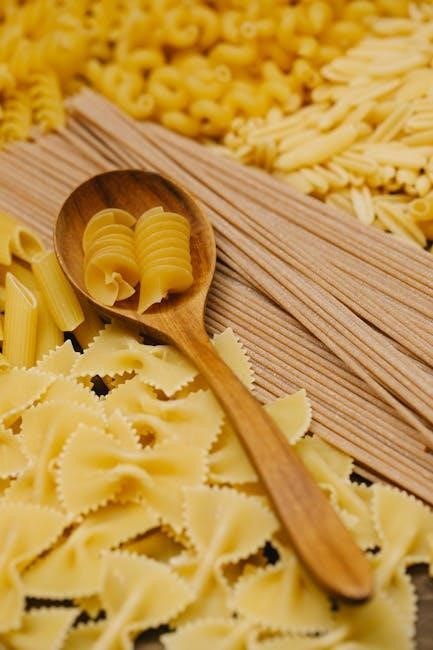blood type b positive diet food list pdf
The Blood Type B Diet, developed by Dr. Peter D’Adamo, focuses on foods that align with the genetic makeup of individuals with Blood Type B.
It emphasizes a balanced approach, combining elements from both animal and plant sources to optimize health and metabolism.
The diet is based on the idea that Blood Type B individuals, with ancestral ties to nomadic tribes, thrive on a diverse and adaptable eating plan.
By avoiding specific foods that can trigger health issues, the diet aims to enhance energy, reduce weight, and improve overall well-being;
Understanding the Basics of the Blood Type Diet
The Blood Type Diet is a personalized nutrition plan that categorizes foods as beneficial, neutral, or avoidable based on blood type.
For Blood Type B, it emphasizes a balanced diet rich in certain meats, dairy, and vegetables while avoiding grains like wheat and corn, as well as legumes and nuts that may cause health issues.
Role of Dr. Peter D’Adamo in Developing the Diet
Dr. Peter D’Adamo introduced the Blood Type Diet, linking dietary choices to blood type for optimal health.
He proposed that Blood Type B individuals thrive on a balanced diet of meats, dairy, and certain vegetables, avoiding grains and legumes that may hinder metabolism and health, based on ancestral genetic traits.
Overview of Blood Type B Characteristics
Blood Type B individuals are known for their efficient metabolism and adaptability, benefiting from a diverse diet due to their ancestral heritage as nomadic tribes.
They thrive on a mix of meats, dairy, and vegetables, avoiding certain grains and legumes.
Their immune system is prone to autoimmune challenges, but a tailored diet can enhance energy and reduce health risks, promoting overall well-being and vitality.
Flexibility in Diet Due to Ancestral Traits
Blood Type B individuals benefit from a flexible diet due to their ancestral background as nomadic tribes, allowing them to thrive on a diverse eating plan.
This adaptability enables them to consume a wide variety of foods, including meats, dairy, and vegetables, while avoiding grains and legumes that can cause health issues.

Efficient Metabolism and Energy Production
Blood Type B individuals often exhibit efficient metabolism and robust energy production due to their unique genetic makeup.
A balanced diet rich in beneficial proteins, vegetables, and fats supports their energy levels.
Avoiding grains like wheat and corn helps maintain metabolic efficiency, preventing fatigue and promoting a healthy, active lifestyle.
Highly Beneficial Foods for Blood Type B
Blood Type B individuals thrive on a diverse diet rich in lean meats, fish, eggs, and green vegetables.
Proteins like lamb and venison, along with seafood such as cod and flounder, are highly beneficial.
Dairy products, including cottage cheese and butter, support metabolism and energy production.
Meat and Poultry: Lamb, Mutton, and Venison
Lamb, mutton, and venison are highly beneficial for Blood Type B individuals, providing lean protein and essential nutrients.
These meats support efficient metabolism and energy production while avoiding lectins that can cause inflammation.
Avoiding pork and chicken is recommended to prevent weight gain and immune challenges.
Seafood: Cod, Flounder, and Salmon
Cod, flounder, and salmon are excellent seafood choices for Blood Type B individuals, offering lean protein and omega-3 fatty acids.
These fish support heart health and reduce inflammation while being easily digested.
Avoiding seafood like shrimp and scallops is recommended to prevent immune challenges and maintain metabolic efficiency.
Dairy Products: Cottage Cheese, Eggs, and Butter
Dairy products like cottage cheese, eggs, and butter are highly beneficial for Blood Type B individuals.
These foods provide essential proteins, vitamins, and minerals while supporting digestion and metabolism.
Eggs and butter are particularly good for energy production and maintaining a healthy weight, making them a great addition to daily meals.
Vegetables: Spinach, Broccoli, and Kale
Spinach, broccoli, and kale are highly beneficial vegetables for Blood Type B individuals.
These greens are rich in vitamins, minerals, and antioxidants, promoting immune health and digestion.
They support energy production and overall well-being, making them excellent additions to a balanced Blood Type B diet.
Foods to Avoid for Blood Type B
Avoid grains like wheat, corn, and buckwheat, as well as legumes such as lentils, chickpeas, and soybeans.
Certain nuts and seeds, including cashews and pistachios, should also be avoided to maintain optimal health.
Grains: Wheat, Corn, and Buckwheat
Grains like wheat, corn, and buckwheat are problematic for Blood Type B individuals. They can cause digestive discomfort, weight gain, and inflammation due to natural lectins.
These foods may slow metabolism and increase the risk of autoimmune conditions. Opting for compatible grains like oats, quinoa, and rice is recommended instead for better health outcomes.

Legumes: Lentils, Chickpeas, and Soybeans
Lentils, chickpeas, and soybeans are legumes that may cause issues for Blood Type B individuals. These foods contain lectins that can interfere with digestion and metabolism.
Consuming them might lead to bloating, fatigue, and weight gain. To avoid these effects, it’s best to minimize or exclude them from the diet and choose more compatible legume options like green beans and peas.
Nuts and Seeds: Avoiding Cashews and Pistachios
Cashews and pistachios are not ideal for Blood Type B individuals, as they may cause inflammation and digestive discomfort. These nuts contain lectins that can interfere with metabolism and energy production. It’s recommended to avoid them and opt for more compatible options like almonds, pumpkin seeds, or sunflower seeds to maintain overall health and well-being.

The Role of Genetics in the Blood Type Diet
Genetics play a crucial role in the Blood Type B Diet, as Dr. D’Adamo’s theory suggests ancestral traits influence food compatibility. This personalized approach aims to prevent health issues like weight gain and autoimmune diseases.
Dr. D’Adamo’s Theory on Ancestral Diets
Dr. Peter D’Adamo’s theory suggests that Blood Type B individuals descend from nomadic tribes, thriving on a diverse diet of meats, dairy, and select plants. Their ancestral adaptability allows for a balanced intake of these foods, avoiding grains like wheat and corn, which can disrupt metabolism and health. This genetic-based approach aims to align modern eating habits with ancient dietary patterns for optimal well-being.
How Genetic Makeup Influences Food Compatibility
Genetic makeup determines how Blood Type B individuals metabolize foods, with certain blood type antigens affecting digestion and immune responses. Dr. D’Adamo’s theory links blood type to ancestral diets, suggesting B types thrive on a balanced mix of meats, dairy, and vegetables while avoiding grains like wheat and corn, which can trigger health issues.
Weight Management Tips for Blood Type B
Blood Type B individuals should balance their diet with lean proteins, vegetables, and low-fat dairy to support metabolism. Regular exercise, such as strength training and cardio, aids in maintaining a healthy weight and energy levels.
Balancing Diet for Efficient Metabolism
Blood Type B individuals benefit from a balanced diet rich in lean meats, dairy, and vegetables. Emphasizing foods like lamb, cod, and spinach supports efficient metabolism, while avoiding grains like wheat and corn helps maintain weight and energy levels. Incorporating compatible grains such as oats and quinoa can further enhance metabolic efficiency and overall health.
Exercise Recommendations for Weight Control
Regular physical activity is crucial for Blood Type B individuals to maintain efficient metabolism and weight balance. Moderate-intensity exercises like cycling, swimming, or brisk walking are ideal. Strength training can also be beneficial, as it helps build muscle mass and further enhances metabolic efficiency, supporting overall weight management and energy levels.

Impact on Immune Health
The Blood Type B Diet helps reduce autoimmune diseases and enhances immune function by focusing on compatible foods that naturally support a stronger immune system.
Reducing Autoimmune Diseases Through Diet
The Blood Type B Diet focuses on eliminating foods that trigger autoimmune responses, such as wheat and corn, which can increase inflammation in Type B individuals.
By incorporating immune-friendly foods like lamb, fish, and leafy greens, the diet helps reduce the risk of chronic autoimmune conditions and supports overall immune function.
Boosting Immunity with Compatible Foods
Compatible foods for Blood Type B, such as lamb, cod, and spinach, help strengthen the immune system by reducing inflammation and promoting nutrient absorption.
These foods align with the body’s genetic profile, enhancing its natural defense mechanisms and reducing the risk of infections and chronic illnesses.

Incorporating Grains and Legumes
For Blood Type B, incorporating compatible grains like oats, quinoa, and rice, along with legumes such as green beans and peas, supports overall health and digestion.
Compatible Grains: Oats, Quinoa, and Rice
Oats, quinoa, and rice are ideal grains for Blood Type B individuals, offering sustained energy and digestive balance.
They are rich in nutrients and fiber, promoting a healthy metabolism and weight management.
These grains are recommended in moderation, complementing a diet rich in meats, vegetables, and dairy products.
Legumes to Include: Green Beans and Peas
Green beans and peas are compatible legumes for Blood Type B, offering essential nutrients and fiber.
They are low in lectins, making them easily digestible and beneficial for overall health.
Incorporating these legumes supports energy balance and digestion, aligning with the diet’s focus on natural, ancestral food choices.

Practical Meal Planning
Plan meals with a variety of allowed foods, such as lamb, spinach, and cod, to ensure a balanced diet.
Incorporate snacks like green beans and peas for added nutrition.
Maintain flexibility by rotating protein sources, vegetables, and grains to keep meals interesting and nutritious.
Sample Daily Meal Ideas
Start with scrambled eggs, spinach, and a slice of quinoa bread for breakfast.
Lunch could include grilled lamb, steamed broccoli, and a side of brown rice.
Dinner might feature cod with roasted kale and a mixed green salad.
Snack on green beans or cucumber slices for a quick energy boost throughout the day.
Healthy Snack Options for Blood Type B
Snack on celery sticks with almond butter or cucumber slices for a refreshing crunch.
Enjoy roasted chickpeas or a handful of green beans for a protein-packed treat.
Low-fat cottage cheese, boiled eggs, or a small portion of quinoa crackers are also excellent choices.
Combine spinach, kale, or arugula for a nutrient-rich salad snack.

Accessing the Blood Type B Diet Food List PDF

Download the Blood Type B Diet food list PDF from Dr. Peter D’Adamo’s official website or trusted health resources and bookstores for a comprehensive guide.
Where to Find Comprehensive Food Guides
Comprehensive food guides for the Blood Type B Diet can be found on Dr. Peter D’Adamo’s official website, trusted health websites, and online bookstores.
These resources provide detailed PDF lists of beneficial and avoidable foods, helping users plan meals effectively.
Ensure to download from credible sources for accurate information.

Utilizing PDF Resources for Meal Planning
PDF resources for Blood Type B Diet offer organized food lists and meal ideas.
They categorize foods into beneficial, neutral, and avoidable, simplifying grocery shopping and daily planning.
Downloadable guides provide clear recommendations, ensuring users can easily incorporate compatible foods into their routines for optimal health and weight management.
